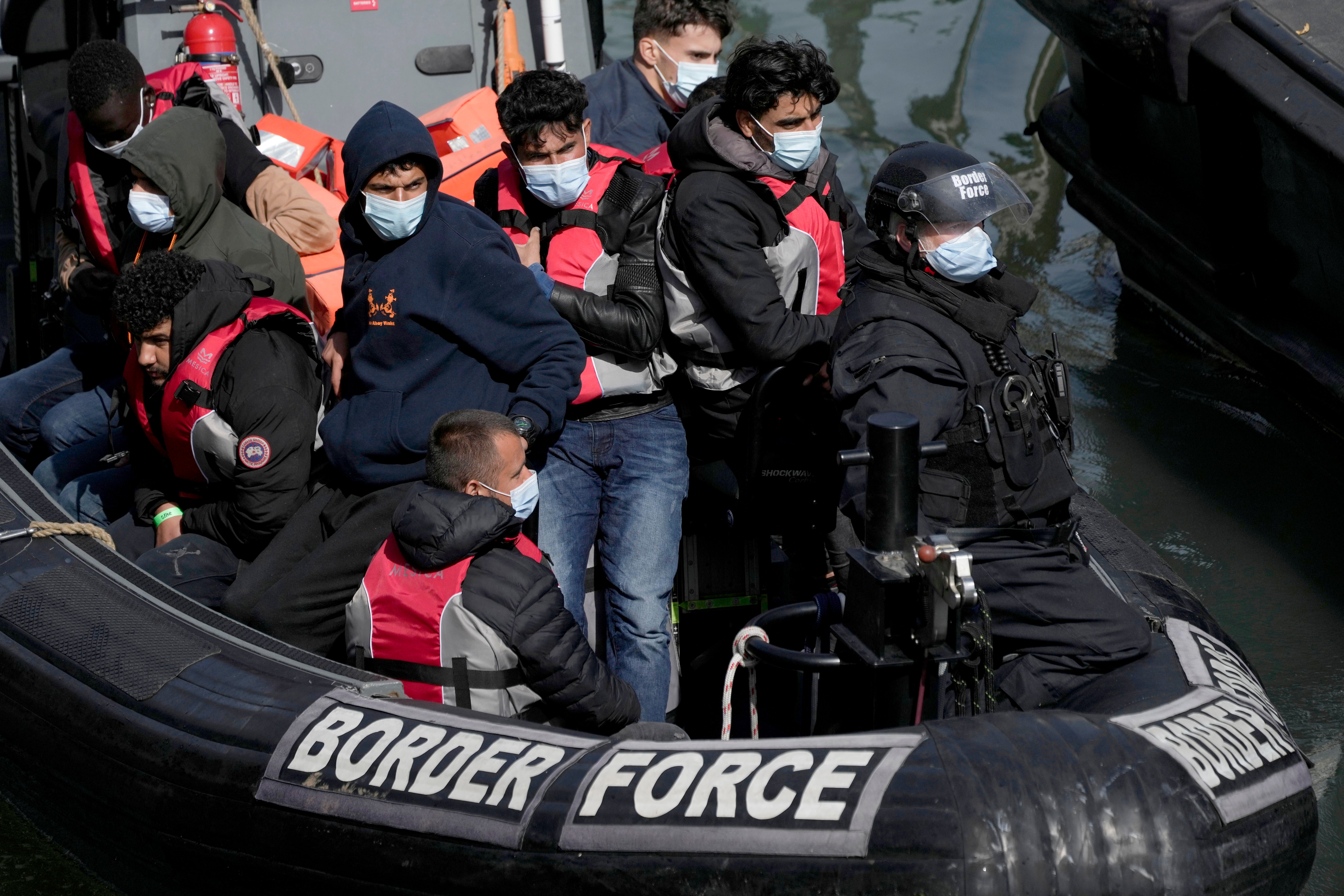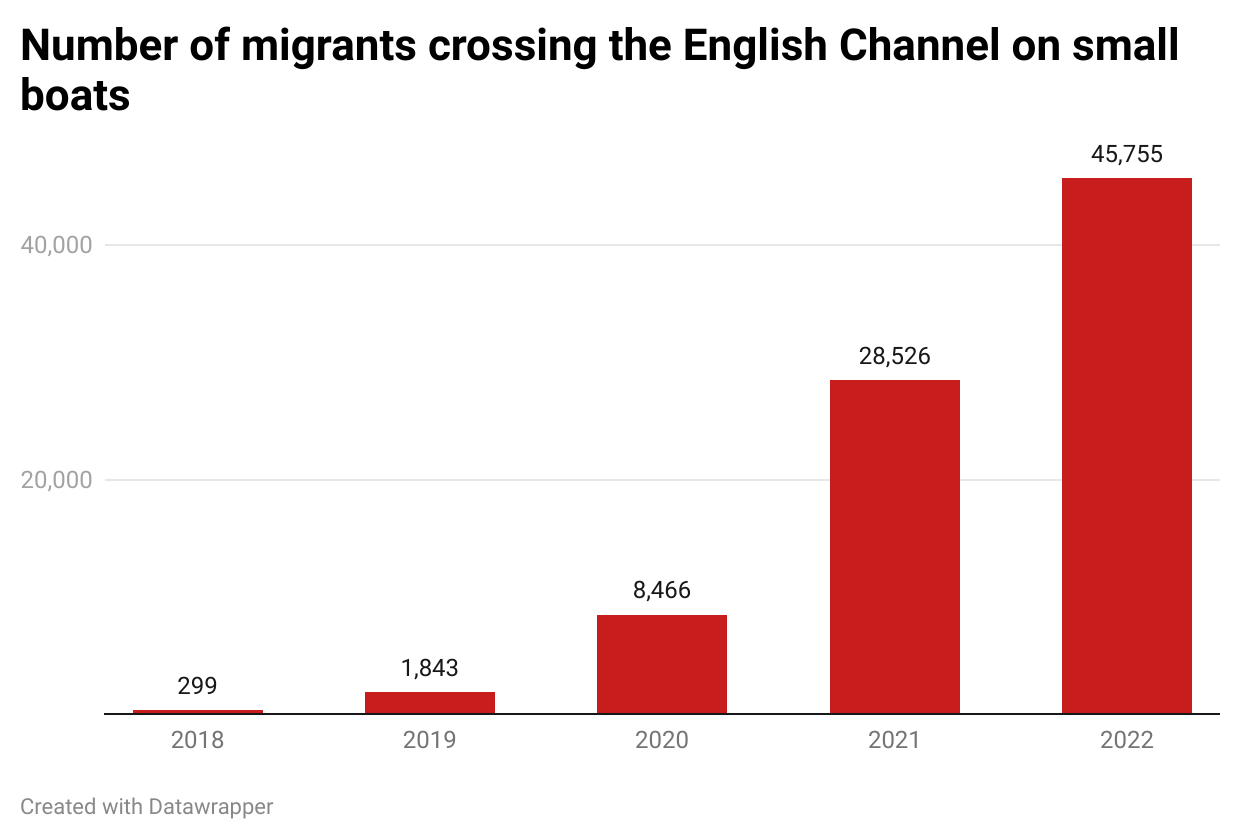More than 600 migrants cross Channel in 2023 record – days after Sunak claimed plan was ‘working’
Numbers crossing rise as seas calm during heatwave

Your support helps us to tell the story
This election is still a dead heat, according to most polls. In a fight with such wafer-thin margins, we need reporters on the ground talking to the people Trump and Harris are courting. Your support allows us to keep sending journalists to the story.
The Independent is trusted by 27 million Americans from across the entire political spectrum every month. Unlike many other quality news outlets, we choose not to lock you out of our reporting and analysis with paywalls. But quality journalism must still be paid for.
Help us keep bring these critical stories to light. Your support makes all the difference.
More than 600 migrants have crossed the English Channel in a new daily record this year, days after Rishi Sunak claimed his plan to “stop the boats” was working.
Figures released by the Home Office show that 616 people arrived in 12 boats on Sunday, bringing the total so far this year to around 8,400.
At the same point last year, the total had just passed 10,000, and last Monday the prime minister hailed the reduction as proof that “our approach is working”.
But Border Force sources told The Independent crossings had been suppressed by weeks of rough seas in the Channel, and experts said much of the reduction had resulted from a drop in Albanian migrants rather than an overall change.
Afghans are now the most common nationality arriving in small boats, following the collapse in the number of refugees resettled directly from the country following the Taliban’s takeover in 2021.
There were no recorded small boat crossings between 28 May and Saturday, when 154 people made the journey as winds dropped and the sea calmed for the first time in a fortnight.
Last Monday, the prime minister hailed progress on his pledge to “stop the boats”, saying that the drop in overall numbers by that point showed “our approach is working”.
“This won’t be solved overnight, and people will continue to come this summer, which is why it’s so important that we change the law,” he added. “I said I would stop the boats and I meant it.”
Stephen Kinnock, Labour’s shadow immigration minister, said Mr Sunak needed to “stop the boast and start stopping the boats”.
“The prime minister got over excited and declared victory in 'stopping the boats' - despite 10,000 asylum seekers crossing the Channel this year,” he added.
“With the weather improving and the number of crossings increasing, Rishi Sunak needs to roll up his sleeves and start doing the hard graft, rather than ploughing on with the headline-chasing, government-by-gimmick approach which landed him in this mess in the first place.”
In response to the figures, the prime minister’s spokesperson claimed crossings “fluctuate on any given day” and Mr Sunak had been speaking about a five-month average.
“The enhanced work with our French counterparts means that you are now more likely to be intercepted and stopped if you attempt to make a crossing than succeed in crossing the Channel,” he added on Monday.
“But, clearly, crossings are continuing and that is because we have not been able to put in place our full plans, and obviously there is a great deal of work across government to that end.”
But on the same day, Home Office submissions to the Court of Appeal said its “operational plans are based on scenarios of up to 56,000 small boat arrivals in 2023”, which would be a new record and a rise of over a fifth on 2022.
The disclosure was made as part of an ongoing legal battle over Suella Braverman’s attempt to transform former military bases into asylum accommodation, using a planning bypass for “emergencies”.
Experts had cautioned that it was “too early to say” whether small boat crossings were on course for an overall reduction this year, and if government policy or other factors were behind any changes.
Dr Peter William Walsh, senior researcher at the Migration Observatory at the University of Oxford said periods of calm weather over the summer would be the “main test”.
“It’s impossible to know the extent to which the decline is driven by a fall in Albanian arrivals,” he added.
“It could be that the government’s deterrent policy is having an effect, but it is currently not possible to disentangle the government’s policy changes from the range of other factors that influence irregular arrivals.”

Lucy Moreton, of the ISU union which represents Border Force staff, said there was “some evidence that the French are becoming much more effective in deterring crossings”.
“There are also an increased number of attempts being aborted and returning to French soil when a vessel has failed,” she added. “However, crossings are continuing and planning continues to anticipate a similar number to last year.”
The government has claimed that its new Illegal Migration Bill, which aims to see all small boat migrants detained and deported without consideration of asylum or trafficking claims, will deter crossings.
But a parliamentary report published on Sunday said the provisions could lead to asylum seekers taking “more dangerous routes” to the UK, benefit people smugglers and worsen trafficking.
An inquiry by the cross-party joint committee on human rights said the government had not provided any evidence backing claims the bill would deter Channel crossings, and that many of its provisions were unlawful.
The government has not yet published an official assessment for the law, which has already been approved by the House of Commons and is being considered by the Lords.
During a debate last week, peers accused ministers of pressuring them to pass laws that have “no practical operability” because the UK has insufficient detention capacity to hold all small boat migrants and returns agreements with only two countries.
A Home Office spokesperson said: “The unacceptable number of people risking their lives by making these dangerous crossings is placing an unprecedented strain on our asylum system.
“Our priority is to stop this illegal trade, and our Small Boats Operational Command is working alongside our French partners and other agencies to disrupt the people smugglers.”
Subscribe to Independent Premium to bookmark this article
Want to bookmark your favourite articles and stories to read or reference later? Start your Independent Premium subscription today.



Join our commenting forum
Join thought-provoking conversations, follow other Independent readers and see their replies
Comments